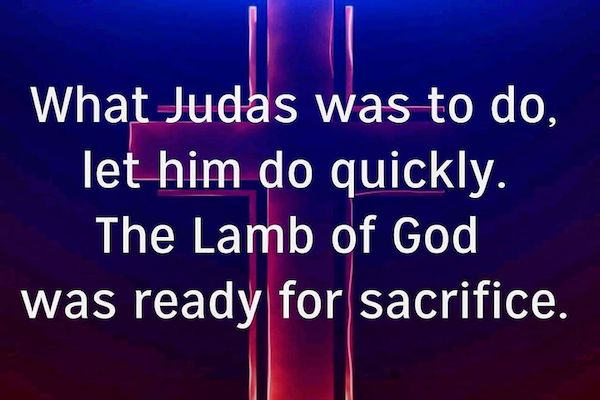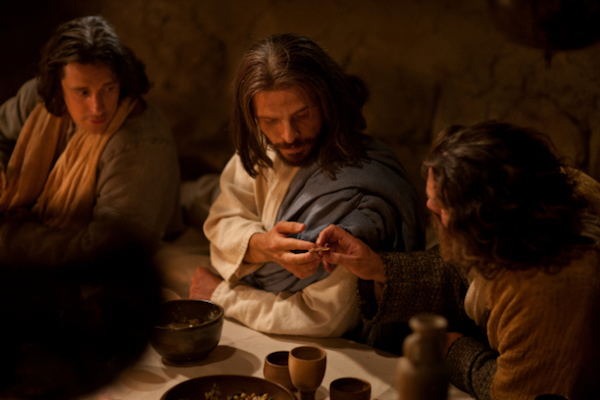LENT 2024: Day 18 - LIFE OF CHRIST

LENT 2024: DAY 18 - Tuesday March 5
“Finally, at the Passover Feast, Our Blessed Lord, after rebuking the disciples’ ambitions and teaching humility by washing their feet, announced the betrayal. As the first scene of the drama, when the Bread of Life was promised, marked the beginning of the treason, so now the Upper Room and the giving of the Bread marked its end. “While they were at table, He said, ‘Believe Me, one of you is to betray Me.’ They were full of sorrow, and began to say, one after another, ‘Lord, is it I?’” (Matthew 26:21-22)
After washing the feet of His Apostles, knowing that the betrayer was already in the midst, He said: “And you are clean now; only not all of you.” (John 13:10)
That His Apostles would know that this heresy or schism or fall in His ranks was not unexpected, He cited Psalm 40 to show it was the fulfillment of prophecy: “The man who shared My Bread has lifted his heel to trip Me up. I am telling you this now, before it happens, so that when it happens you may believe it was written of Me.” (John 13:18-19)
Only one who has suffered such betrayal from within the household can even faintly grasp the sadness of the Savior’s soul that night. All the good example, counsel, companionship, and inspiration are fruitless with those who will to do evil or “sell out” to those who are bent on destruction. One of the strongest expressions used of the sorrows of our Lord was now used to describe His love of Judas and his freely willed doom: “Jesus bore witness to the distress He felt in His Heart; ‘Believe Me, believe Me, one of you is to betray Me.” (John 13:21)
The “one of you” was one whose feet He had washed, one whom He called to the apostolic office of spreading His Church throughout the world after the coming of His Spirit, one whose presence He suffered so patiently that not one of the other Apostles knew who it was. “And the disciples looked at one another, at a loss to know which of them He meant.” (John 13:22)… Nothing could have disturbed their peace of soul more than to know that one of them failed the Prince of Peace. “They were full of sorrow, and began to say, one after another, ‘Lord, is it I?’” (Matthew 26:22)… When Our Lord was asked, He answered: “It is the man to whom I give this piece of bread…, and gave it to Judas, son of Simon, the Iscariot.” (John 13:26)
Throughout the first part of the Passover meal, both Our Lord and Judas had been dipping their hands in the same dish of wine and fruit. The very fact that Our Lord chose bread as a symbol of the betrayal might have reminded Judas of the Bread promised at Capharnaum. Humanly speaking, it would seem that Our Lord should have thundered out His denunciation of Judas, but rather in a last attempt to save him He used the bread of fellowship. “He answered, ‘The man who has put his hand into the dish with Me will betray Me. The Son of Man goes on His way, as the Scripture foretells of Him; but woe upon that man by whom the Son of Man is to be betrayed; better for that man if he had never been born.’” (Matthew 26:21-24)
In the presence of Divinity, no one can be sure of his innocence, and everyone asked, “Is it I?” Every man is a mystery to himself, for he knows that within his heart there lie, coiled and dormant, serpents that at any moment would sting a neighbor with their poison, or even God. One of them could be sure that he was the traitor and yet no one could be sure that he was not. In the case of Judas, even though Our Lord revealed His knowledge of the treason, there was still his fixed determination to do the evil. Notwithstanding the revelation of the knowledge of the crime and the fact that his evil was stripped naked, he was not ashamed to consummate it in all of its ugliness. Some men turn away from horror at their sins, when the sins are put bluntly before them… But here Judas saw his treachery described in all its deformity, and practically said in the language of Nietzsche, “Evil, be thou my good.”… “’It is the man to whom I give this piece of bread which I am dipping in the dish.’ Then He dipped the bread, and gave it to Judas, the Son of Simon, the Iscariot.” (John 13:26-27)
When Our Lord said: “It is the man to whom I give this piece of bread which I am dipping in the dish”, He was actually using a gesture of friendship. The giving of the morsel seems to have been an old Greek custom as well as an oriental one. Socrates said that, in all instances, the giving of a morsel to a table neighbor was a mark of favor. Our Lord help open to Judas the opportunity for repentance, as he would do later on in the Garden of Gethsemane. But though Our Lord held open the door, Judas would not enter. Rather Satan would enter in. “The morsel once given, Satan entered into him; and Jesus said to him, ‘Be quick on thy errand.” (John 13:27)
Satan can possess only willing victims. The mark of mercy and friendship extended by the Victim should have moved Judas to repentance. The bread must have burned his lips, as the thirty pieces of silver later on would burn his hands. A few minutes before the hands of the Son of God had washed the feet of Judas; now the same Divine hands touch the lips of Judas with a morsel; in a few hours, the lips of Judas will kiss the lips of Our Lord in the final act of betrayal. The Divine Mediator, knowing all that would befall Him, gave the order to Judas to open the curtain wider on the tragedy of Calvary. What Judas was to do, let him do quickly. The Lamb of God was ready for sacrifice.
“When he had gone out, Jesus said, ‘Now the Son of Man has achieved His Glory, and in His Glory, God is exalted.’” (John 13:31) His death would not be a martyrdom, a disgrace, or an inevitable consequence of betrayal… In this Hour – when His Soul faced sorrow, His Body a scourging, His mind a travesty of justice, His will a perversion of goodness – did He thank the Father. The Father would be glorified by His redemptive death, and He would be glorified by the Father in His Resurrection and Ascension.”

(Chapter 38, pgs. 619 – 629)
+ FRASES PARA LEER